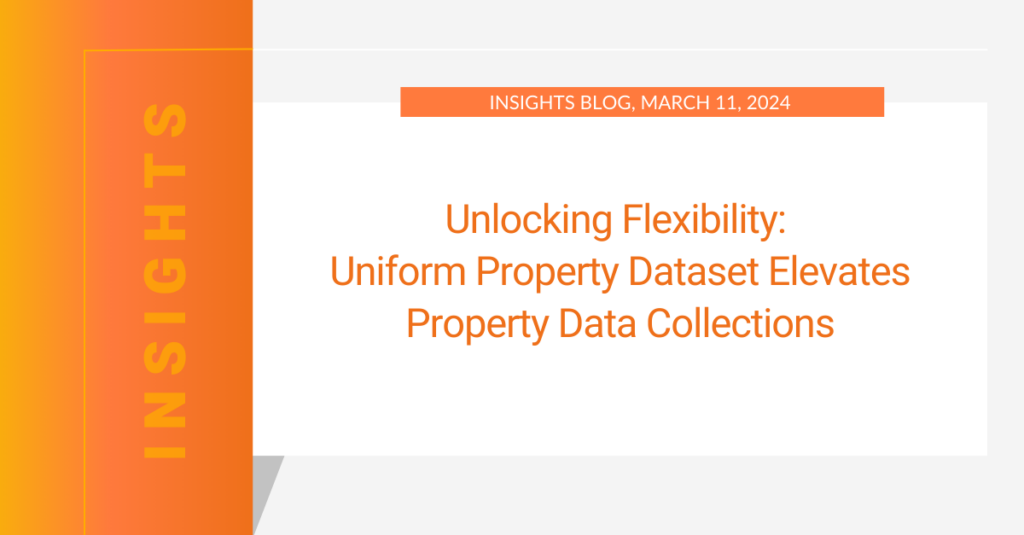
Kristin Gruidl
Veros’ Senior Product Manager
Over the past year, the Government-Sponsored Enterprises (GSEs), Fannie Mae® and Freddie Mac®, have expanded eligibility for inspection-based appraisal waivers, paving the way for more eligible borrowers to benefit from a wider range of real estate valuation solutions.
Starting April 1, 2024, the Uniform Property Dataset (UPD), a standardized data set, will be mandatory for new loan applications that use Fannie Mae’s value acceptance + property data, Freddie Mac’s ACE+ PDR (automated collateral evaluation plus property data report) solutions, and hybrid appraisals. The wonderful thing about UPD is that lenders no longer need to restart data collections if a loan changes hands among guarantors; it gives lenders flexibility across the mentioned GSE solutions.
Now is the time to embrace the future of real estate valuation and experience all the benefits the GSE’s solutions provide with cost-effective property data collection and UPD. Together, they provide efficiency, accuracy, and savings for lenders and borrowers alike.
Benefits Unleashed with Property Data Collections
Utilizing property data collections for eligible mortgage loans offers several benefits that streamline the lending process and enhance overall efficiency. Here are some key advantages:
- Significant Cost Savings: Often eliminates the need for a traditional appraisal, leading to substantial cost savings for lenders and borrowers.
- Consistent Data and Collection Methodology: Ensures accuracy and reliability throughout the process, reducing the risk of discrepancies or bias.
- Ample Photo Evidence and Detailed Floor Plans: Provides comprehensive understanding of the subject property, enhancing clarity and transparency.
- Flexibility for GSE Usage: Can be seamlessly utilized by either GSE, enhancing accessibility and convenience.
- Improved Clear-to-Close Certainty: Bypasses reliance on appraised value, leading to enhanced confidence in transaction completion. Property data collection may also improve the likelihood of an appraisal waiver on future sales or refinances of the property.
- Streamlined Administrative Tasks: GSE data submission is taken care of (if desired), with results conveniently stamped onto the final product, reducing administrative burden and facilitating smoother transactions.
Leveraging property data collections presents a myriad of advantages, including the ability save time and money, and enhanced accuracy and confidence in mortgage lending transactions.
Get Ahead - Prepare for the Future
While mortgage application volume may be slow at present, investing in the adoption of property data collection solutions can position lenders for future growth and success in the ever-changing and competitive lending market. There are several reasons why a lender should consider implementing innovative solutions now:
- Cost Savings Now: Implementing property data collection solutions can lead to cost savings for lenders in the long run. Per MtgeFi’s March 2024 report, inspection-based waivers saved borrowers an average of $375 per loan and $10.8M in total in the past 12 months. This is based on 28,745 inspection-based waivers being used on loans and an average borrower fee of $600 for a 1004 single-family residential appraisal and $225 for an inspection. It is clear that by automating data collection ordering processes and reducing the need for manual intervention, lenders can lower their operational expenses and improve their overall efficiency.
- Competitive Advantage: Investing in the processes to utilize property data collection solutions now can give lenders a competitive advantage over their peers. By adopting innovative technology early, lenders can differentiate themselves in the market and attract borrowers who value efficiency and convenience.
- Preparation for Increased Demand: Implementing property data collection solutions during slow periods allows lenders to easily prepare for potential increases in mortgage application volume in the future. By having systems in place beforehand, lenders can streamline their processes and be more efficient when demand picks up.
- Enhanced Risk Management: Real estate property data collection solutions provide lenders with an app-driven, consistent data set that minimizes human error and offers an extremely low revision rate. When a hybrid appraisal is required, property data collections reduce the chance of bias or discrimination, as the appraiser is never onsite or involved directly with the borrower.
- Improved Customer Experience: Property data collection solutions can also enhance the customer experience by speeding up the mortgage application process and providing borrowers with more accurate information about the properties they are interested in. This can lead to higher customer satisfaction levels and increased loyalty over time.
Embracing property data collection solutions now is key to staying ahead. By investing in innovation, lenders can seize this opportunity to stay in the game and have a chance at a successful future in lending.
Valuation Modernization is Here
The offering of Fannie Mae’s value acceptance + property data, Freddie Mac’s ACE+ PDR (automated collateral evaluation plus property data report) solutions, and the implementation of the Uniform Property Dataset (UPD) signals a shift towards greater data standardization and digitalization in the real estate and mortgage industry. As technology advances and data consistency becomes increasingly important, UPD serves as a foundation for future innovation and collaboration among industry participants. Moving forward, we expect to see further developments in data standardization, interoperability, and analytics. In addition, there will continue to be a drive towards improvements in efficiency, transparency, and risk management across the real estate and mortgage ecosystem.
Valligent is ready to support lenders’ national valuation modernization needs, including fulfilling GSE data collections and upgrades to hybrid appraisals. Want to learn more? Reach out to us and explore our GSE Data Collection Suite here.
For more information on the GSE’s loan eligibility or to learn more about the GSE’s solutions, see the Fannie Mae’s value acceptance + property data fact sheet and Freddie Mac’s ACE+ PDR FAQs.




